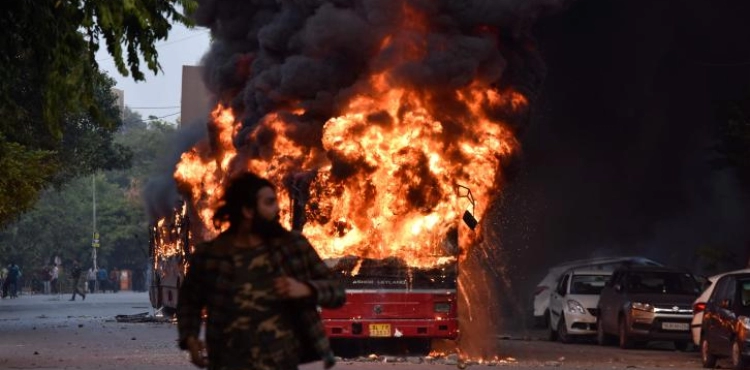Angry demonstrators in northeast India Sunday vowed to continue demonstrations against a controversial new law on granting citizenship to non-Muslim illegal immigrants, with the death toll from bloody clashes rising to six .
Tension remains high at the epicenter of the protests in Guwahati, the largest city of Assam, where police patrols amid tight security.
The new law passed by parliament on Wednesday allows the Indian government to grant citizenship to millions of illegal immigrants from three neighboring countries on or before December 31, 2014, provided they are not Muslim.
These countries are Pakistan, Bangladesh and Afghanistan.
In Assam state, four people were killed after the police shot them, while another person was killed when a store was being set on fire, while a sixth person was killed after he was severely beaten during a demonstration, according to what officials announced.
About five thousand people participated in new demonstrations in Guwahati on Sunday, within the sight of hundreds of policemen. The participants chanted anti-law slogans and held banners reading "Long live Assam."
The law raised Muslim fears, and the proposed changes led to protests in which residents who were dissatisfied with the influx of Hindus from Bangladesh who would benefit from the law participated.
"Assam will continue to protest. India is a democratic country and the government should listen to us," said Karan Milli, fellow victim Asur Nayak, 25, who died on Sunday.
"We do not want violence, but the demonstrations will continue ... Assam residents will not stop until the government repeals the law," protester Pratima Sharma told France Press.
Officials said that oil and gas production in the state was affected by the impact of the curfew, despite the easing of restrictions Sunday and the opening of some stores.
In West Bengal state, where protests continued for a third day, the state´s chief minister, Mamata Banerjee, who opposed the passage of the law, ordered a cessation of Internet service in many areas.
The demonstrators set tires and organized strikes on highways and railroads and set fire to trains and buses, and authorities pushed riot police to disperse the protesters while stopping train services in some areas of the state.
In New Delhi, several buses were set on fire and a video recording on social media showed the police firing tear gas at the demonstrators.
The Press Trust of India reported that about 35 people were injured in the clashes and were taken to hospital, while the authorities said that schools in the area would be closed on Monday.
The police also entered the Jamia Melia Islamic University in Delhi after clashes to detain some people, although the university said that its students had not participated in the violence.
Indian Prime Minister Narendra Modi has blamed the protests against the opposition Congress Party.
"To give respect to those who fled to India and were forced to live as refugees, both houses of parliament passed a bill to amend citizenship," he told a gathering in Jharkhand state.
"The Congress Party and its allies are inflaming the anger over the citizenship law, but the Northeast residents reject violence ... They (supporters of the Congress Party) resort to arson, because they have not succeeded," he added.
The Home Minister, Amit Shah, once again called for calm.
"The culture, language, social identity and political rights of our brothers and sisters from the Northeast will remain the same," he was quoted by News 18 as saying in Jharkhand.
Islamic groups, opposition and human rights organizations believe that the law is part of the Indian Prime Minister´s Hindu national program, to marginalize the Muslims in India, who number about 200 million people.
Rights groups and a Muslim political party challenge the law to the Supreme Court on the grounds that it contravenes the constitution and secular traditions in India.
Asom Jana Barishad, an ally of Modi’s Bharatiya Janata Party in Assam and who has supported the bill in parliament, told local media that she now plans to challenge the law before the Supreme Court.












